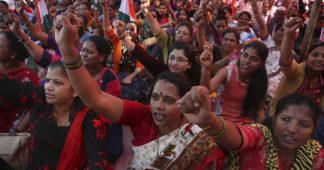by Jamie Woodcock
January 10, 2019
On the 8-9th of January, 150 million workers went on strike in India. The strike was organised by ten different trade unions, covering transport, banks, financial services, government company, power, steel, car and other factory workers. It follows the protests by farm workers, who are joining in the action. Jamie Woodcock was in Bangalore and attended the demonstration on the first day of the strike.
In Bangalore the strike was strong, shutting down transportation across the city. On the 8th of January, the unions called for a demonstration outside the town hall. There was the visible presence of transport workers (mainly bus drivers), factory workers (particularly aerospace), and bank workers, who joined a lively picket from across the road. While the weather reached around 30 celsius, the demo grew more and more packed. Police officers in tan uniforms, equipped with helmets and large batons, kept their distance at the edge of the demo.
Most of the flags on the demonstration were red, many with hammers and sickles. In Bangalore, the most prominent were the All India Trade Union Congress (AITUC) and All India United Trade Union Centre (AIUTUC). The AITUC is the oldest union federation in India and associated with the Communist Party of India (CPI), with a registered membership of almost 2.7 million. The AIUTUC is the trade union wing of the Socialist Unity Centre of India (Communist), with a claimed membership of over 2 million. In addition to this, there were a range of other communist affiliated unions, including AICCTU, TUCC, CITU, and so on. To an outside observer, the differences between their different red flags with hammers and sickles could be a little hard to discern. What was clear was that this strike was mobilising large numbers of workers.
I was introduced to an organiser at the demonstration who explained that in Bangalore the strike was strongest among public transport workers, industrial workers, bank employees, insurance employees, anganwadi (child care), and ASHA (accredited social health activist) workers. He argued that the Modi government was pushing anti-worker and anti-farmer measures, in particular privatisation, demonetisation, and other recent changes which were destroying jobs. The strike was “political” as an anti-government action, but also had a series of demands. The organiser sent the list over WhatsApp:
12 point charter of demands of the working class, supported by JOINT COMMITTEE OF TRADE UNIONS (JCTU): INTUC, AITUC, CITU, HMS, AIUTUC, TUCC, AICCTU, KWU, KGWU, BANK, INSURANCE, JAF and other independent unions. Major Demands:
- Stop all pro-corporate, anti-worker amendments to Labour laws
- Against the privatization & corporatization of Transport system proposed in the Motor Vehicles (Amendment) Bill, 2017
- Implement a national common minimum wage of Rs.18,000/- per month for all workers.
- Institute universal Public Distribution System to contain inflation and price-rise
- For the legislation of compulsory recognition of unions and mandatory registration of trade unions within 45 days and for the ratification of ILO conventions 87 & 98 (for freedom of association and right to collective bargaining) in the Parliament
- Abolish contract labour system. Implement the principle of equal pay for equal work and regularize contract and all non-permanent forms of employment.
- Stop the disinvestment of Public Sector Units and disallow Foreign Direct Investment (FDI) in Banking, Insurance, Defense sectors.
- Regularise the employment of scheme workers as Government employees as per the recommendations of the 43rd Indian Labour Conference.
- For the institution of social security fund for the unorganised workforce with sufficient budgetary allocation and provide Provident Fund coverage for all unorganised workers.
- In the context of job losses due to demonetization & economic crisis, implement urgent measures to generate stable employment and regularize the NEEM, NETAP and FTE forms of employment through amendments.
- Increase the eligibility limit & maximum limits for Payment of Annual Bonus, Gratuity, Provident Fund and ESI. Stop the investment of Provident fund and Pension funds in the stock markets. Stop the diversion of ESI funds to the Reliance group.
- Implement the recommendations of the MS Swaminathan Committee including a complete waiver of farm loans and the legislation of the “right to sell at Minimum Support Price”.
Read more ta https://notesfrombelow.org/article/india-general-strike-2019











